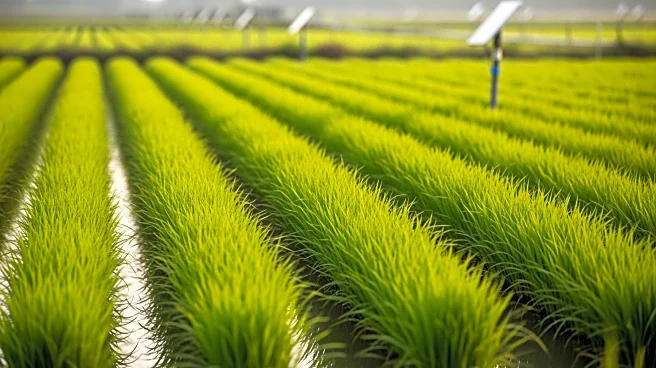What's Happening?
Bangladesh is undergoing a significant transformation in its agricultural sector, driven by technological advancements and innovative practices. Historically, agriculture has been a cornerstone of Bangladesh's
economy and culture, but it faced challenges during British rule and the zamindari system, leading to exploitation and decline. Post-independence, the government prioritized agricultural reform, establishing institutions like the Bangladesh Agricultural Research Council and the Bangladesh Rice Research Institute. These organizations have spearheaded research and innovation, resulting in the development of over 120 high-yielding rice varieties resistant to environmental stresses. Mechanization has also played a crucial role, with nearly 90% of arable land now cultivated using modern machinery, significantly boosting productivity and efficiency. Additionally, digital tools and smart agriculture practices are being integrated, with farmers accessing vital information through mobile technology and employing AI for crop management.
Why It's Important?
The transformation of Bangladesh's agriculture sector is crucial for the nation's food security and economic stability. By adopting modern technologies and practices, Bangladesh is moving towards self-sufficiency in rice production and expanding its export capabilities in vegetables and fruits. This shift not only enhances productivity but also reduces labor costs and increases efficiency. However, challenges remain, such as ensuring fair prices for farmers and addressing climate change impacts. The sector's contribution to GDP is disproportionately low compared to the workforce it employs, highlighting economic disparities. Addressing these issues is vital for sustaining the agricultural sector's growth and ensuring the livelihoods of millions of farmers.
What's Next?
Bangladesh aims to continue its agricultural advancements by focusing on precision farming, AI-driven management, and smart greenhouses. The government is also working on improving supply chains to ensure fair prices for farmers and reduce post-harvest losses. Climate-smart agriculture models are being developed to mitigate the impacts of climate change, with innovations like saline-resistant rice and solar-powered irrigation. The future of Bangladesh's agriculture lies in creating a sustainable, technology-driven system that prioritizes farmer welfare and environmental sustainability.
Beyond the Headlines
The agricultural transformation in Bangladesh also highlights the role of women and youth in driving innovation. Women are increasingly involved in various stages of the agricultural process, while young entrepreneurs are exploring e-commerce and smart farming techniques. This shift not only empowers these groups but also contributes to the sector's modernization. Additionally, the integration of technology in agriculture is setting a precedent for other developing nations facing similar challenges, showcasing the potential of innovation in overcoming traditional agricultural limitations.










